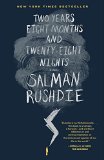Summary | Excerpt | Reviews | Beyond the Book | Read-Alikes | Genres & Themes | Author Bio

Critics' Opinion:
Readers' Opinion:
First Published:
Sep 2015, 304 pages
Paperback:
Jul 2016, 304 pages
 Book Reviewed by:
Book Reviewed by:
Davida Chazan
Buy This Book
This article relates to Two Years Eight Months and Twenty-Eight Nights
Those versed in Muslim philosophy and theology have probably heard of both Ghazali and Ibn Rushd, but when I first read Two Years Eight Months Twenty-Eight Months I thought they were fictional. When I discovered they were real people who had written the books Rushdie talks about, I decided to find out more about them.
 Ghazali of Tus, also known as Al-Ghazâlî (c.1056–1111), was an intellectual well known among royalty, military and political leaders of Baghdad during his early career. However, he abandoned that life, believing that these leaders were corrupting influences, who might endanger his religious beliefs and ruin his chances at the perfect afterlife. Although he did return to secular life at one point, he retained his deep religious beliefs. The text that Rushdie refers to in his novel is his Incoherence of Philosophy, which is tough to summarize in a few lines but, simplistically speaking, tore apart the contemporary philosophical thinking of the time (which was rooted in the Greek philosophers such as Aristotle and Plato). Al-Ghazâlî argued that a logical justification and explanation of God is impossible, and that nothing happens that doesn't come from God's grand design. Through his writings, Ghazali brought the Sunni denomination of Islam to the fore, some sects of which eschew philosophy completely in preference to faith and devotion.
Ghazali of Tus, also known as Al-Ghazâlî (c.1056–1111), was an intellectual well known among royalty, military and political leaders of Baghdad during his early career. However, he abandoned that life, believing that these leaders were corrupting influences, who might endanger his religious beliefs and ruin his chances at the perfect afterlife. Although he did return to secular life at one point, he retained his deep religious beliefs. The text that Rushdie refers to in his novel is his Incoherence of Philosophy, which is tough to summarize in a few lines but, simplistically speaking, tore apart the contemporary philosophical thinking of the time (which was rooted in the Greek philosophers such as Aristotle and Plato). Al-Ghazâlî argued that a logical justification and explanation of God is impossible, and that nothing happens that doesn't come from God's grand design. Through his writings, Ghazali brought the Sunni denomination of Islam to the fore, some sects of which eschew philosophy completely in preference to faith and devotion.
 Ibn Rushd, also known as Averroes (1126—1198), came to philosophy through the study of law, and took up the challenge to bring philosophy back into the fold of Islam, by stating that Muslim scriptures never opposed this discipline. In fact, he went so far as to propose that philosophy was actually the most effective way to reach religious enlightenment. More importantly, he felt that religion needs a critical and philosophical approach to find otherwise hidden meaning and depth, which he thought might lead to a misunderstanding of God altogether, and distortion of the religion of Islam. One can imagine how many theologians of Ibn Rushd's day would have been appalled at anything that might have dissuaded any of their followers from blind faith and pure devotion. This was why they burned Ibn Rushd's books and he ended up in exile for just over two years. Some thinkers within Christianity adopted his approach, who became the scholars called "Averroists," and after his death even Jewish theologians studied his writings.
Ibn Rushd, also known as Averroes (1126—1198), came to philosophy through the study of law, and took up the challenge to bring philosophy back into the fold of Islam, by stating that Muslim scriptures never opposed this discipline. In fact, he went so far as to propose that philosophy was actually the most effective way to reach religious enlightenment. More importantly, he felt that religion needs a critical and philosophical approach to find otherwise hidden meaning and depth, which he thought might lead to a misunderstanding of God altogether, and distortion of the religion of Islam. One can imagine how many theologians of Ibn Rushd's day would have been appalled at anything that might have dissuaded any of their followers from blind faith and pure devotion. This was why they burned Ibn Rushd's books and he ended up in exile for just over two years. Some thinkers within Christianity adopted his approach, who became the scholars called "Averroists," and after his death even Jewish theologians studied his writings.
From this basic dichotomy, Rushdie brings Ghazali and Ibn Rushd into a fictional argument that could only unfold after both are long dead, with the help of a fantastical jinn. While Ghazali's beliefs mostly mirror the actual man's writings, Rushdie amplifies Ibn Rushd's championing of philosophy and reason to such an extent that the two become essential cogs in the events that pit the godly against the godless on earth. With these types of battles, combined with the way Rushdie describes his world thousands of years in the future, it would be sad but not altogether surprising if someone issues a new fatwa against him very soon.
It is interesting to note that there is no bloodline connection between Rushdie and Ibn Rushd; but Rushdie's father took the surname in order to honor this important philosopher.
al-Ghazali, courtesy of www.pursuit-of-happiness.org
Ibn Rushd, courtesy of Jcb
Filed under People, Eras & Events
![]() This "beyond the book article" relates to Two Years Eight Months and Twenty-Eight Nights. It originally ran in September 2015 and has been updated for the
July 2016 paperback edition.
Go to magazine.
This "beyond the book article" relates to Two Years Eight Months and Twenty-Eight Nights. It originally ran in September 2015 and has been updated for the
July 2016 paperback edition.
Go to magazine.





The House on Biscayne Bay
by Chanel Cleeton
As death stalks a gothic mansion in Miami, the lives of two women intertwine as the past and present collide.

The Flower Sisters
by Michelle Collins Anderson
From the new Fannie Flagg of the Ozarks, a richly-woven story of family, forgiveness, and reinvention.

The Funeral Cryer by Wenyan Lu
Debut novelist Wenyan Lu brings us this witty yet profound story about one woman's midlife reawakening in contemporary rural China.
Your guide toexceptional books
BookBrowse seeks out and recommends the best in contemporary fiction and nonfiction—books that not only engage and entertain but also deepen our understanding of ourselves and the world around us.